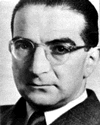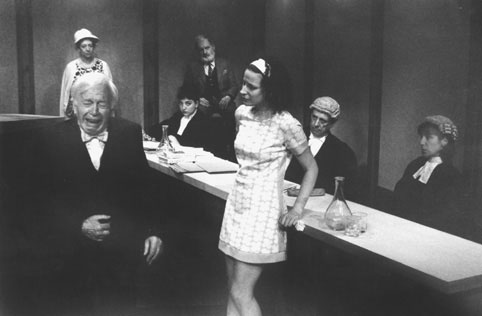Co-editors: Seán Mac Mathúna • John Heathcote
Consulting editor: Themistocles Hoetis
Field Correspondent: Allen Hougland
Rudolf
Kasztner THE
KASTNER TRIAL - shown at the Jewish Film Festival in
1997 Shamash:
The
Jewish Internet Consortium: Holocaust Home
Page 1.1
Background The chief character of the
play, Yaron, portrays Rudolf (Reszö) Kasztner, who from
1943-5 was a vice-chairman of the Zionist organised
Relief and Rescue Committee of Budapest. The play is based on a libel
trial in Israel. Kasztner was accused in 1954 of connivance
in the deportation of around 400,000 Hungarian Jews to the
gas chambers of Auschwitz-Birkenau during the Nazi
occupation from 1944-5. He sued his accuser Malkiel
Grunwald. Grunwald had accused Kasztner
of making a deal with the Nazis, to save his friends and
relatives in return for remaining silent about the 400,000
deportations. The libel trial turned into a
highly charged public examination of Kasztner's role in the
leadership of the Relief and Rescue Committee. The judge ruled against
Kasztner, declaring that he had 'sold his soul to the devil'
In 1957 Kasztner was assassinated by nationalist extremists.
In 1958 the Israeli Supreme Court reversed the 1955
judgement. 1.2 Analysis The initial slur on Kasztner
was politically motivated. It was an attack on the Mapai
(left-wing Zionist) Government of which Kasztner was a
lesser minister and which was seen in some ways as the heir
of the Hungarian Zionists. In fact, Kasztner probably would
not have sued had he not interpreted the accusation as a
slight on his party. Grunwald's lawyer was a member
of the right-wing Herut party, and partially in consequence
of his success at the trial he subsequently entered the
Knesset (Israeli parliament) and was appointed Minister of
Justice in Menahim Begin's first Government. Although the issues of
Hungarian Zionist complicity with Nazism, and Kasztner's
role in particular, were used within Israel as a
party-political weapon, they have provided ammunition for
outright anti-Zionists to attack the foundations of the
Israeli state and in fact the very ideology of Zionism.
Understanding the political context in which the play has
its roots is the key to understanding the controversy around
the play. Whatever lip-service is paid in the play's text to
Kasztner's exoneration by the Israeli Supreme Court is
obscured by the over-riding message of the play, which is
simply anti-Zionist. It will be seen below that Kasztner has
also been exonerated in the history books, because the bases
(sic) on which he and the Hungarian Zionists were accused
are almost entirely false. 2.1
Introduction The narrative of events in
Hungary is heavily distorted by the politicised nature of
the play. It should be emphasised that this distortion is
not the result of the playwright adopting an informed
historical stance - i.e. the play's theme is not simply one
side in an equal debate about the way things were. Rather,
the play is a classic example of a political agenda overtly
influencing a portrayal of history. To illustrate this point
by analogy, while not comparing Perdition with the
more disturbing phenomenon of Holocaust denial, it is clear
that the latter is the creation of a political ideology
(extreme rightism) rather than any reasoned interpretation
of the past grounded in extensive historical
research. To set the record straight in
accordance with research conducted by some of the most
prestigious historians of the Holocaust period, there follow
a few substantiated historical points which refute the broad
implications of Perdition.


Although Michael Billington of
The Guardian encountered no demonstrators outside the
Gate, we found two members of the Union of Jewish Students
(UJS), handing out a leaflet entitled Perdition: Dancing
on the Graves of the Victims. Reading this, we noted
their claim that "outright anti-Zionists", had used the
Kasztner story as "ammunition" to attack the foundations of
the Zionist state of Israel and thus "the very ideology of
Zionism" itself. The UJS also claim, without providing any
reference, that Kasztner has been "exonerated in the history
books" and that the basis on which the Hungarian Zionists
have been accused are "almost entirely false" (our
emphasis). Paradoxically, they mention later that Kasztner
"was too generous in vouching for some Nazi's after the
war", and the UJS invites people to believe the absurd
proposition that Kasztner's motivation for putting members
of his own family, and "a selection of wealthy Jews" on the
controversial train to Switzerland, was to signify to the
rest of the 476,000 Hungarian Jews that the Nazi criminal
Adolf Eichmann, was a "bona fide" man who could be trusted
and this was the beginning of a "larger rescue operation". I
bet that was what Zionist's like Kasztner told Hungary's
Jews - Don't run ! Don't fight ! Don't worry ! They will
be another train to Switzerland ! Eichmann is a good man -
he can be trusted . . .
Billington asked in his
review, at what point "does pragmatic co-operation become
collaboration ?". The play raises awkard questions about how
far people should collaborate with evil to stay alive - a
question which is as relevant today as it was during the
struggle against fascism during the 1940's. Since there is
documented, shocking evidence of Zionist collaboration with
the SS in Hungary - from holocaust survivors themselves such
as Dr Verba and Rabbi Weissmandel - this was always going to
a controversial issue for any playwright such as Jim Allen
to address, notwithstanding the attempts by Zionists to
suppress the truth about something which actually happened
in wartime Hungary, and to find out why only 1700 Jews were
saved whilst almost 500,000 went to the gas chambers of
Auschwitz. None of this appears to be dealt with in any
detail by the UJS leaflet, which in our view, attacks the
play unfairly, tainting it with the brush of "holocaust
denial" and "extreme rightism" (as they call it). The
strongest impression we had after coming out of the play was
that it gave a balanced view of both sides of the story.
The following
below is published and distributed by Union of Jewish
Students (UJS) in conjunction with the Holocaust Educational
Trust
PERDITION
DANCING ON THE GRAVES OF
THE VICTIMS
1. THE POLITICAL
CONTEXT
2. HISTORICAL CONTENT OF THE
PLAY
e mail: ujs@brijnet.org